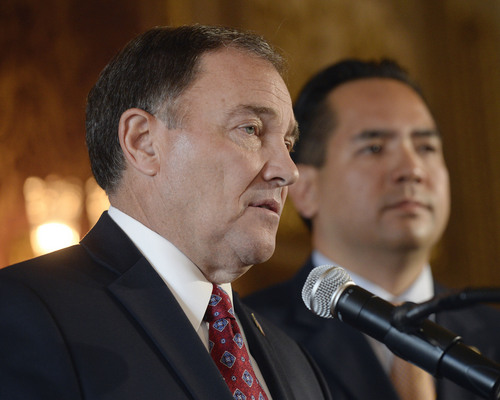This is an archived article that was published on sltrib.com in 2014, and information in the article may be outdated. It is provided only for personal research purposes and may not be reprinted.
To his credit, Utah Gov. Gary Herbert was unequivocal Monday that same-sex marriage is now the law of the land, and he made a sincere request for Utahns on both sides of this contentious issue to treat each other with respect. We wholeheartedly agree.
But the governor also made clear he was disappointed that his state could not continue to deny the due-process rights of its citizens.
Governor, that is not respect.
If the governor really wants to move on, he needs to stop defending his claim that U.S. District Judge Robert Shelby created "chaos" last December by not granting a stay that the state didn't even ask for originally. In the end, Utah didn't even get its day in the Supreme Court because Judge Shelby's decision was so unassailable.
And the governor needs to make clear that any other case that hinges on denying marriage rights to same-sex couples also is now moot. That includes the case in which the state was sued for not honoring the marriages performed last December, and it includes the adoption cases involving same-sex couples. Any reluctance on those cases is not only a needless delay of justice. It also increases the state's liability for paying their opponents' legal costs.
The state's two U.S. senators are not helping. Sen. Mike Lee says flatly that the Supreme Court got it wrong, and Sen. Orrin Hatch is perpetuating the false hope that another circuit court will still bring the issue to the Supreme Court to reverse the marriages it allowed with Monday's decision. Those statements are more than mere political posturing. They encourage people to delay the needed healing, and that is destructive.
One state legislator is already thinking about making a distinction between same-sex marriages and other marriages in adoption cases. Rep. Kraig Powell Monday raised the question of the parental rights of a biological father when the mother is in a same-sex marriage, and he brought up the term "pairage" as a possible way to distinguish between the same-sex and opposite-sex marriage.
In fact, there is nothing unique about that biological father's situation. Right now there are thousands of biological fathers who share rights with the biological mother and her spouse. (Reference Dr. Seuss' "The Sneetches" for more on the futility of this approach. No doubt there's a Sylvester McMonkey McBean out there willing to sell Utahns a star-off machine that will make their marriages different, but it ultimately will fail the constitutionality test, too. Separate is not equal.)
And there will come challenges from businesses whose owners claim a religious right to choose only clients who would be allowed to marry in their churches. Before the state invests its resources in protecting those businesses, it should think long and hard about both the legal and political costs of holding out against a national wave of change.
The same-sex marriage debate likely will go on in many homes and churches in Utah, but it should not continue in government. The state never proved same-sex marriage would harm other families, so its political leaders need to stop acting like it does.



